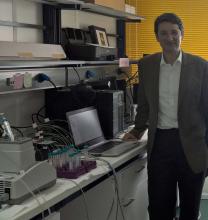Invited Talks - Prof. Athanasios Nenes

Abstract
Human activities profoundly alter the composition of the atmosphere, leading to a cascade of effects on climate, ecosystems and human health. Atmospheric particulate matter, or aerosols, play a central role in all these changes; they affect climate by modulating the Earth’s energy balance, clouds and precipitation; they contain toxic compounds which upon inhalation cause millions of premature deaths every year. The same particles also contain substances that act as nutrients when deposited in ecosystems, which in turn can affect primary productivity. Much of the predictive uncertainty surrounding human impacts on the Earth System are related to poorly understood processes involving the emission, transformation and related impacts of atmospheric aerosol.
Knowledge of the levels and drivers of aerosol acidity (pH) is critical for understanding many aerosol processes that determine aerosol concentrations, chemical composition, toxicity and nutrient bioavailability. Despite its importance, aerosol pH remains poorly constrained because its direct measurement is currently not possible. This talk will focus on recent advances in constraining in-situ particle pH from the thermodynamic analysis of aerosol and gas-phase composition, and show that strong acidity (pH of 0 to 3) is ubiquitous in global aerosol. The strong acidity is caused by the large difference in volatility between sulfate (the main acidic compound, which resides completely in the aerosol phase), and ammonia (the main neutralizing agent, which partitions between aerosol and gas-phase). This counterintuitive, but thermodynamically consistent result, explains why for example aerosol acidity in the southeastern United States or in South Europe has not decreased over the past few decades, despite a 70% reduction in sulfates and a constant ammonia background. Strong acidity, however, can be reduced from the presence of non-volatile cations (e.g., Na, K, Ca, Mg from seasalt and mineral dust) to the point where nitrate aerosol formation is readily promoted, and, the solubility of highly toxic trace metals (e.g., Fe, Cu) can be highly affected. Because of this, errors in the representation of NVC in models can bias pH to yield completely incorrect model predictions. We conclude by emphasizing the need to evaluate models for their predicted pH, and, to revisit the conceptual model used by the aerosol community and policymakers to rationalize the drivers of aerosol acidity.
Speakers Short CV
Athanasios Nenes is a Professor of Atmospheric Processes and heads the Laboratory of Atmospheric Processes and their Impacts (LAPI) at the Ecole Polytechnique Federale de Lausanne, Switzerland. He is an affiliate researcher of the Institute of Chemical Engineering Science at FORTH. He is a Web of Science Highly Cited Researcher, having authored/co-authored close to 300 manuscripts (Google Scholar citations: 24100, h=82). He is the prime author of the ISORROPIA aerosol thermodynamics models, and instrumentation to measure aerosol properties and Cloud Condensation Nuclei. He serves as President of Atmospheric Sciences of the European Geophysical Union, and member of the UN Joint Group of Experts on the Scientific Aspects of Marine Environmental Protection (WG38: Atmospheric input of chemicals to the ocean), the Committee on Nucleation and Atmospheric Aerosols, and served on the US National Academies Committee on the Future of Atmospheric Chemistry Research (2014-2016), Secretary of Atmospheric Sciences of the American Geophysical Union (2012-2016), Board of Directors of the American Association for Aerosol Research (2014-2017) and Editor in the Copernicus journal Atmospheric Chemistry and Physics (2004-2019). He is an American Geophysical Union Fellow (2020); recipient of a ERC Consolidator Grant (2016); Vaughan Lectureship, California Institute of Technology (2014); Ascent Award, American Geophysical Union (2012); Whitby Award, American Association for Aerosol Research (2011); Houghton Award, American Meteorological Society (2009); Sigma Xi Young Faculty Award (2007); Friedlander Award, American Association for Aerosol Research (2005); NASA New Investigator Award (2004) and a National Science Foundation CAREER Award (2004).
